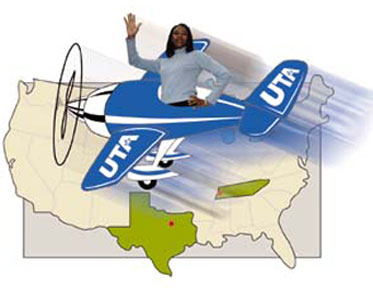| Q&A with UTA's oldest living graduate | Alumni as college presidents | Recognition of contributors |
 |
||
| Home Forethought Campus Buzz Feature Stories Re:Search The Score Alum News Yesteryear | ||
Fretting over long commutes is a national pastime. But you won’t hear Gloria Carr grumbling about her weekly 470-mile trek from Memphis, Tenn.
|
|
| Nursing Ph.D. student Gloria Carr, who commutes to UTA from Memphis, expects to complete her degree in two years. |
“I am not at UTA by chance,” says the nursing doctoral student—and full-time critical care instructor at the University of Memphis Loewenberg School of Nursing—about why she willingly endures such a punishing schedule. “UTA is the route God chose for my preparation.”
Last semester, Carr climbed out of bed at 1:30 a.m. to drive nearly 150 miles from Memphis to Little Rock, Ark., for a flight to Dallas/Fort Worth International Airport on class days. There were few flights between the two cities, and a tight budget forced her to search for reduced fares.
Now it’s easier. After teaching all week in Memphis, she sleeps in until 4:30 a.m. Thursday before getting ready for her 6:45 flight. On arrival, she rents a car and drives to UTA where she works 10 hours as a research assistant in the Center for Nursing Research.
Then she’s on the road again, this time to Dallas and the home of her sister-in-law, Sandra Wright. On Friday morning she’s up at 6 to drive back to campus and spend the day in class. She returns to the airport and flies home, usually arriving after 9 p.m.
Carr earned her master of science in nursing at the University of Tennessee and was advised to diversify her education when she began investigating doctoral studies. She had not found a program that fit her interests. A colleague told her that the UTA School of Nursing was starting a Ph.D. program.
UTA’s program was approved in April 2003 and launched that August. Forced to do some quick marketing, School of Nursing administrators held an open forum to promote it. Much to interim Associate Dean Mary Lou Bond’s surprise, Carr flew in from Memphis and was the first person interviewed.
“It was hard to believe she would be able to pull it off,” said Dr. Bond, adding that the curriculum demands are rigorous. “She is so low-keyed and quietly self-confident. I don’t think she has missed a single day since we began more than a year ago.”
Carr, who expects to complete her studies in about two years, attributes her staying power to several things, beginning with a deep faith that she says sustains her and gives her enthusiasm and persistence to see her dreams come true.
Then there is her “wonderful family.” She and husband Martin have three children: Tiffany, 25; Carlos, 21; and 15-year-old Casey, the only child still living at home. Carr discussed her decision with the family before she began at UTA, and everyone accepted different roles and chores.
“We made a schedule for who will do specific things to keep the household running. Sometimes we falter, but overall we stay on task. And even though I still teach full time at the university, my dean graciously allows me time in my workload for school.”
She gives the professors in UTA’s School of Nursing high marks as well.
“The faculty are very nurturing and supportive, and that helps keep me motivated. And even though it is a brand new program, they are totally organized,” she said. “I had heard UTA had a great nursing school, and it has certainly lived up to my expectations.”
For Martin Carr, the hardest part initially was dealing with his wife’s absence on a regular basis. He’s grateful for technology like the cellphone that enables them to keep in touch. The arrangement also means that Casey is often on his own after school while his dad works as a police department supervisor.
“But he is an exceptional teen. I feel that the values we tried so hard to instill in him really took hold,” said the proud father, who admits that he still tries not to focus on how long Gloria will be away.
After all the commuting, Carr plans to stay at the University of Memphis after earning her doctorate. She wants to direct her primary professional attention to improving the health care of African-American grandparents.
“I have so many questions,” she said. “What is the best way to impact their health? How do we empower them and build advocacy? Impacting change among my race of grandparents is my immediate goal.”
— Sue Stevens
| Archives
| Alumni Association |
Giving to UTA | UTA
Home Copyright © 2005 UTA Magazine. All rights reserved. |
